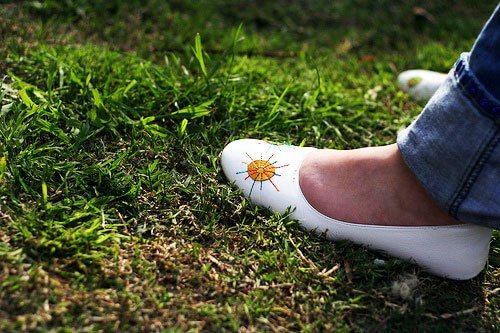The Benefits of Sleep: 8 Tips for Getting Quality Sleep

Written by Stacey Taggart, Contributing Writer
The importance of getting a good night’s sleep is understated in our busy society. The expectations that we have of ourselves and others are increasing, and in an effort to do all and be all, we end up burning the candle at both ends.
Being deprived of sleep is very detrimental to us physically, mentally, emotionally, and even spiritually.
“Sleep isn’t a luxury… It’s a biological necessity!” – Unknown
The Benefits of Sleep
We know what a lack of sleep can do to a child. An overtired child is cranky, irritable and inconsolable. And we all know how we feel when we don’t get enough sleep, but we may not know how important sleep really is for our bodies, minds and souls.
Sleep is restorative, rejuvenating and regenerative :: Every part of the body benefits from – and requires – sleep. The body’s ability to rebuild itself during sleep is amazing! Damage is repaired on the cellular level during deep sleep stages. Sleep is your body’s opportunity to restore itself from the effects of stress, toxins, ultraviolet rays and other harmful exposures that occur during the day.
Sleep reduces illness and disease :: Due to our body’s ability to rebuild itself, the immune system greatly depends on sleep to function. With other systems of the body in rest mode, the immune system can go to work fighting and protecting. With a lack of sleep also comes a depressed immune system allowing harmful germs and exposures to wreak havoc on our systems.
Sleep reduces stress :: As we prepare for sleep, our body releases the calming hormones, serotonin and melatonin. These hormones help us relax and also cause the stress hormones, adrenaline and cortisol, to deplete, reducing the stress our bodies feel.
In contrast, being sleep deprived puts our body in a state of stress as it releases the stress hormones so that it can function under those less-than-ideal circumstances.Having these hormones being pumped through our body too frequently is extremely detrimental to our health. When we sleep, we give our body and minds the opportunity to rest and restore from the day and adjust and balance hormone levels.
Sleep can help control weight :: When our hormone levels are out of balance from lack of sleep, it increases our appetite, making us eat more than we would if we weren’t sleepy. There is also concern that lack of sleep changes the way our body digests carbohydrates, which can cause weight gain.
Sleep improves memory function :: While our body is resting, our brain is working! When we sleep, our brain analyzes the events of the past day, making connections and creating links. These links become our memories! By getting sufficient quality sleep, we are giving our brain the opportunity it needs to process and commit new information to memory.
Sleep = Safety :: Brain fog caused by lack of sleep can cause car accidents, falls, medical mistakes and much more. Researchers have found that a sleepy driver behind the wheel is just as dangerous as a drunk driver.
Sleep balances emotions :: Sleeping gives our brain the opportunity to correct and adjust all the hormone and chemical levels that the body requires. Having proper levels of these vital elements helps us remain balanced and steady throughout the day, with increased ability to handle the day-to-day stresses. Not getting enough sleep can leave us feeling irritable, irrational and impatient.

Image by juanktru
How much is enough?
Research shows that the average adult needs between 7 and 9 hours of sleep per night. However, the exact amount of sleep that our bodies require is very individualized, varying from person to person. This can also change rather frequently as we face different situations in our lives that may require more or less sleep.
For example, if you are sick or going through a particularly stressful period of time, you need to allow for more sleep. Children, teenagers and the elderly, as a rule, need more sleep than healthy adults.
Experts say that finding the right amount of sleep requires a little experimentation. By varying your bedtimes and wake times, you can find the right amount of sleep that leaves you feeling well rested and energized throughout the day.
As your situation and circumstances change, you might need to adjust your sleep times to allow enough time for adaquate sleep, without sleeping too much. Sleeping too much can be just as detrimental to your health and well being as being sleep deprived, so find the right balance that works for you.
“A satisfying sleep, like a satisfying meal, can leave one happy and content, without feeling too full, and with room, perhaps, for just a little more.” – Jim Horne, sleep expert
That’s great, you might be thinking, but I can’t sleep! Far too often, sleeping is not as simple as it sounds.

Image by pdam2
8 tips to help you get your zzz’s
Make sleep a priority :: Look at sleep as the restorative period that it is rather than an inconvenient obligation. Give your mind, body and soul the opportunity to rest and rejuvenate.
Establish a routine :: Bedtime routines aren’t just for children. Try to go to bed at the same time each night and wake up at the same time each morning, regardless of the day of the week or if you’ve had a rough night’s sleep. Wake up within 30 minutes of your waking time each day of the week. This will help your body clock set itself correctly.
Relax :: Can’t sleep? We’re not able to will ourselves or make ourselves go to sleep. We need to lie down, close our eyes and relax, waiting for sleep to overtake us. But the relaxing part of that equation often fouls up the entire formula. Drink a cup of chamomile tea or warm milk, take a warm bath or read a book for a few minutes before turning off the light. Give yourself time to slow down and unwind, letting your body know it’s time to prepare for sleep.
Add a mind purge :: When I can’t sleep because I’ve got too much on my mind, I’ve found that simply having a pad of paper and a pen by my bed comes in handy. Thoughts, plans and worries can often interfere with our ability to relax and fall asleep. Write down everything that comes to mind in a 1 to 3 minute period. As simple as it sounds, it will enable you to free your mind of those thoughts and avoid carrying them to bed with you. With less on your mind, you are free to relax and drift off to sleep.
Body movin’:: Getting some form of physical activity during the day will help your body differentiate between daytime and nighttime, making it easier to get to sleep and stay asleep when you want to. Avoid strenuous exercise and activity within 4 hours of going to bed so your body will be able to relax in time for sleep.
Eat well and wisely :: Ditch the Standard American Diet and eat real food. Make your noon meal the largest of the day rather than your biggest meal being a few hours before you are going to try to sleep. Digesting a large meal will keep you awake and unable to drift off to sleep.
Make your bedroom a restful place :: Keep your bedroom free from unnecessary clutter and distractions. Remove the TV and designate another area of your house for your desk and computer (or put them behind doors if they must stay in your room) so as to free your mind from thinking about work and other things.
Limit caffeine (or better yet, quit it all together) :: Use coffee, pop, caffeinated teas and even chocolate in moderation. Caffeine is a powerful stimulant. Even if you only drink caffeine in the mornings, it makes it more difficult to fall asleep at night and affects the quality of sleep that you are able to get. It is difficult to quit (I know! I used to be a Diet Coke junkie.) but it’s worth it.
If you can’t get going in the mornings without your cup of joe, try Dandelion Root tea as a worthy coffee alternative. Do the same only make iced tea as a replacement for Diet Pop! Dandelion Root tea sounds odd perhaps, but it’s yummy!
What about those less-than-ideal nights?
Unfortunately, we all know the frustration of a short night’s sleep. Whether it’s a new baby, sick kids, noisy neighbors or irritating insomnia, we’ve all been there. Here are two tips for surviving those terrible nights:
Don’t worry :: The stress and anxiety over getting a poor night’s sleep will actually be harder on you mentally and physically than the poor night’s sleep itself. Practice an attitude of acceptance and go about your day. Try to remain as positive and optimistic as possible and you’ll get through a less-than-ideal day much more ideally!
Strategic naps will save you :: Even if you’re not necessarily a nap taker, a strategic nap will help you get through your day, minimizing your struggle from a poor night’s sleep. Getting a 10 – 20 minute nap (or two, if necessary, one in the morning and one in the afternoon) will help you feel refreshed and energized, ready for the next portion of your day. Be careful, however. Napping anywhere from 30 minutes to 2 hours puts your body through sleep cycles that will cause you to wake up feeling groggy and perhaps worse than you felt before. Aim for the power nap to get you through your day.
We all know how wonderful we feel after a great night’s sleep, and unfortunately, we all know how terrible we feel when we sleep poorly. In our fast-paced, over-worked and stressed-out society, getting a good night’s sleep is crucial. Our bodies, minds and souls depend on our ability to sleep for rejuvenation, repair and restoration.
Make a New Year’s Resolution to make sleep a priority this year! Your mind and body will thank you.
What tips do you have for getting a great night’s sleep? How do you make sleep a priority?
Top image by pedrosimoes7
Other Related Posts You May Enjoy
- What is “Real” Health?
- What it Means to Be Well
- My Journey to Burnout: Proof That I Really Can’t Do It All
- Developing the Exercise Habit
- Staying Motivated to Excercise
- Finding Fulfillment in Being A Mother Only
- Naturally Neutralizing Stress: Herbs that Calm
- The Terrible Thirst of Depression
- Treating Depression Naturally: Supplements, Herbs, and Foods for Feeling Better
- Panel Discussion on Burnout and Fatigue: 3 Women Get Real About Their Struggles part one and part two
- What is Adrenal Fatigue and Do I Have It?
- Adrenal Fatigue: Help and Resources for Healing
- How to Create the Perfect Sleep Environment






Stacey, this was a great post! I wish we could shout it from the rooftops! 🙂 Most adults I know just do not understand how important it is to get a good night’s rest. In fact, I know someone who is very diligent about eating good foods and exercising, yet she averages 4-5 hours of sleep a night. People will take care of themselves in all ways except this. We try very hard not to be out too late during the week because my husband has to get up at 5 in the morning. He needs time to “wind down” before bed each evening so if we’re out late, he just can’t go home and go right to sleep. Our prayer meeting on Wednesday, for instance, tends to run late, but yet we seem to be the only people who are eager to get out of there by 9:00 so we can go home and get some rest. I know everyone’s health would improve greatly if they would just get more sleep. Thank you for this post!
@Holly,
holly, my husband and i are usually the first to want to go home too! i just hate that overtired feeling the next morning when i haven’t gotten enough sleep! i’m glad we’re not the only ones!
Stacey- Very well written article and so true…. believe you asked for tips.. on sleeping from others; hope this is the right place to do so..
I am fortunate and have good, regular sleep…
I did not used to…
Two things that really helped me were #1- creating the regular habit of trying to retire at approx the same time each evening.. and
#2 – I take my second ‘daily clay’ followed by water approx 3 to 4 hours before retiring… and sleep like a baby… ‘Living Clay’ is what I use and sell; just one of the many benefits it delivers…
@Paul Mackey,
Paul, how does the clay help with sleep? I checked out the Living Clay website but it seems like its more skin care related? I am curious!
Sleep is also a huge priority to our family, and in fact, the one thing I am most “anal” about with my kids. I keep their bedtimes & naptimes pretty much always on routine and they have slept SO well (and continue to, years later) because they get enough. Of course we realize it in children’s behavior (cranky, etc.) but why wouldn’t it be the same for us?!
We are standard 8-8.5/9 hr sleepers and we love it! Thanks for this excellent post.
Sarah M
@Sarah M,
i’ve tried at certain points to get more done by sleeping less but it’s only come back to bite me. we’re 8 -9 sleepers too! thanks for the comment!
Here’s a crazy thing that I learned in The Four Hour Body by Tim Ferris….ice. Yes, I’ve been icing my neck and upper shoulders/back for about 20-30 minutes in the evening. I’m sleeping like a baby. Previously I had been waking up around 3 am, hitting the restroom and my mind would start racing. Now if I do wake up, I go right back to sleep. Ahhhh….I love a good night’s sleep.
J
Caffeine will NOT keep you awake at night IF you have enough magnesium in your system. Epsom salts in a bath or internally before bed can make a huge difference in relaxing. A light snack, like gelatinous broth, helps too.
@Jenny,
that’s interesting jenny… i’m not familiar with that but it’s certainly something to look into. i’ve been hitting the dark chocolate lately and i’ve noticed a difference in my sleep. is adding a magnesium supplement effective?
@stacey, Yes, magnesium is very relaxing. If I didn’t take it before sleep I probably wouldn’t get any sleep.
Wonderful tips!! This is definitely helpful to me as I’m working through what my new year will look like.
This has some great ideas. I wish I could sleep for 10-20 min at a time during the day though. It takes me a long time to fall asleep, especially during the day. I wish there was some kind of alarm that could sense when I went to sleep and then time 10-20 min after that to go off. LOL
I wake at night several times, usually at least 3, sometimes, often, as many as 10 or more. I have a health issue that affects my bladder and brings me pain and the feeling like I have to use the washroom. Its either that or my kids that wake me up– my oldest usually wakes once and youngest wakes once or twice too. I just wish I could figure out some way for the bladder to not wake me at night. Its not from drinking too much, its from my health issue that I’m dealing with. I keep meaning to do more research on natural pain relief but so far only use a hot water bottle on my bladder to reduce the pain so I can at least fall asleep (during the day it also bothers me but not as much since I am doing other things).
@Nola,
@nola – hopefully you can get some relief from your health issues soon! that’s always a double edged sword… feeling poorly and then difficulty sleeping on top of it.
as far as the naps… i set my alarm for 30 minutes when i’m laying down. if i do fall asleep, it’s only for 15-20 mins because it takes me a while to get to sleep too. sometimes, when i’m really tired, i fall right off to sleep and it’s awesome! but usually it takes me a while and sometimes i don’t sleep at all. even if i don’t sleep, i figure the 30 min. rest is beneficial.
hope you start feeling better soon and get some relief!
I find that when left to my own devices (which is almost always since I don’t use an alarm clock) I sleep between 8 – 9 hours and then wake up. It doesn’t matter when I go to bed, unless I’m sick, I sleep almost exactly the same amount. Unfortunately I often have insomnia (so the 8 hours are from 1am – 9 am… I’d rather wake up with the sun) and the quality of my sleep is very low. I’ve been reading lately about how even small amounts of light can disrupt the body’s circadian rhythms so I’m about to replace my translucent roman shades with some heavy duty black out window coverings. The neighbors have a bright security light near our bedroom window so hopefully black out shades will help.
I also noticed a few years ago when hurricane Ike blew through and we were without electricity for a week that not using the lights in the evening really helped me relax (that and the electric hum of fridges, air conditioners, etc) so we’re thinking about getting some oil lamps and only use their low light after dark. It will take some getting used to but I suspect we’ll adjust our schedule so that we finish things before dark.
@annie, This is a really good point! I often work night shifts and have to sleep during the day… Using black out curtains, or even just some cardboard behind the blinds, make all the difference. The other “tricks” to help me relax and fall asleep were: using white noise, an eye mask and ear plugs, and reading something boring (lol) before settling down to sleep.
I’m very much enjoying being on maternity leave, and NOT having to do night shifts for the time being 🙂
@Kris, Oh and I keep the clock out of sight, so I can’t clock-watch and count the hours ticking away. I started this years ago, when I struggled with insomnia.
@Kris,
very good point Kris! i started using my cell phone as an alarm clock rather than an alarm clock and i automatically slept better!
Your tip about relaxing is one I really struggled with a few years ago. The more I worried about the fact that I couldn’t get to sleep–obviously the longer it took! I would keep looking at the clock and counting how many hours of sleep I would get if I fell asleep right then. This all changed when I read (I wish I could remember where) that even if you are not actually asleep, your body can reap almost all the benefits of sleep if you simply rest–meaning you lie still, breathe deeply, and close your eyes. Now, instead of fretting that I’m not asleep, I just let myself rest and enjoy knowing that I am letting my body use energy to restore and repair itself rather than to worry tossing and turning!
@Mallory,
thanks mallory! that will help me too!
@Mallory, I didn’t know that, either! I also struggle with insomnia and sometimes get stressed out about the hours of sleep that I am missing. That’s really good to know that the rest itself is helpful. Phew… 🙂
this is a great post and definetely something i needed to hear so thank you for sharing! i always tell myself i need to be in bed my X o’clock every night and stupid things like browsing websites and watching TV get in my way and i’m up past midnight – which is not good when i need to be up by 7am! i need my sleep and definetely need to start making it a big priority.
Hello,
Do you have recommendations on curtains? I’m trying to research the material in “blackout liners” but it ‘s difficult to find. I’d like to add a liner to the curtains in what will become the baby’s room, but I don’t want anything that could be toxic. Thanks!